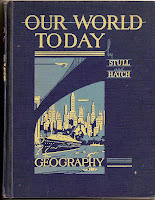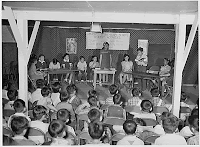History and Old Stuff...
 My 1941 Social Studies book, Our World Today, has been lying on the coffee table, and I've been browsing through it for the last week or so. This book appeals to me because it was written just as my parents were becoming adults, immediately before America entered World War II. It also interests me as a background of the events of 2007.
My 1941 Social Studies book, Our World Today, has been lying on the coffee table, and I've been browsing through it for the last week or so. This book appeals to me because it was written just as my parents were becoming adults, immediately before America entered World War II. It also interests me as a background of the events of 2007.Kurds and Wahabis
For example, in the chapter about the Near East, there's a half-page photo of a large group of Kurdish men on horseback. Most seem to have heavy mustaches but not full beards. They are wearing black turbans and carrying rifles. The caption reads:
Mounted Kurdish Warriors of Northwestern Persia
The Kurds live in a region of lofty mountains extending into the three countries of Persia, Iraq, and Turkey. Some of them live in villages, raising fruits and cereals, but many are nomadic tent dwellers, devoting their time to raising horses, cattle, sheep, and goats. The Kurds have been much feared on account of their sudden raids upon the bordering villages of other races. These are some of the lawless people whom Reza Shah Pahlevi has had to subdue in order to make traveling safe in Persia.
Source: Our World Today (p. 377), a geography textbook written by De Forest Stull and Roy W. Hatch and copyrighted in 1941 by Allyn and Bacon, Boston, MA
A few pages over, there's a photograph of an old Wahabi man. He has a white beard but no mustache, and he's wearing a light-colored robe that's gathered up loosely by a belt hidden under the folds. His head is also covered with cloth. He's holding a staff that's as tall as he is. The caption reads:
Wahabi Tribesman of Arabia
The Wahabi who live in the interior of Arabia are the strongest people of the Arab tribes. Although they follow the Koran with almost fanatical zeal, they do not hesitate to waylay and rob pilgrims on their way to Mecca, and to make themselves feared and hated for their raids on border settlements.
Source: Our World Today (p. 383), a geography textbook written by De Forest Stull and Roy W. Hatch and copyrighted in 1941 by Allyn and Bacon, Boston, MA

British Influence on the Arabian Peninsula
In the text, the authors explain that Great Britain has taken "some part in the control" of several nations along the Persian Gulf and the Red Sea to reduce the pirate attacks on British ships conducting commerce in the area.
The quotation about Wahabi tribesmen (above) mentions that their attacks on border settlements. Those would have been settlements of Koweit (1941 spelling), Oman, Aden and Yemen that bordered the sea on the outside and the Great Arabian Desert on the inside. The authors note that the interior borders of the small nations along the ocean are not well defined.
On a political map of the region, Aden at the mouth of the Red Sea is labelled "Aden (Br.)" and in Africa, just across the Gulf of Aden, is "British Somaliland." Today, Somalia is a terrorist hotbed and a nation in the turmoil of civil war, and Somalian pirates are still a big problem for shipping in the area.

The Energetic Americans
In the section about the United States, the authors give a number of reasons that America has become a world leader in manufacturing. These include natural resources, climate, etc., and also "an energetic people."
Americans are noted for their energy and the vigor with which they go at their undertakings and carry them through. In slang phrase they have "pep." Our salesmen are known as "go-getters because they go after and get business.I wonder if the authors would say the same thing about Americans today? I doubt that we hustle the way we used to do. I think we expect more leisure and entertainment than those who had come through the Great Depression allowed themselves. I don't think today's writers of Social Studies books would even attempt to influence children to think of themselves as peppy go-getters. They'd be more interested in getting children think of themselves as tolerant.
Americans hustle, that is they move quickly and aim to accomplish a lot of work in a short time...
Source: Our World Today (p. 383), a geography textbook written by De Forest Stull and Roy W. Hatch and copyrighted in 1941 by Allyn and Bacon, Boston, MA
 Children in an assembly hall at Amache Elementary School
Children in an assembly hall at Amache Elementary SchoolPublic domain image from the early 1940's
courtesy of the Franklin D. Roosevelt Library and Museum

Related post: Impact of the Automobile
Technorati tags:
1941
Wahabis
Kurds
What do you think? Comments are welcome.
2 comments:
ah... I love history. Although, I've noticed that most history text books seem to be "dumbed down" and/or purged of the really interesting stuff....
L., I have been talking so much about this old book, Our World Today, that my son got interested in it tonight and spent about an hour looking through it. It really is a time capsule.
Post a Comment